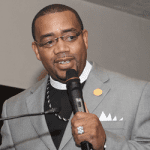
I have many anti-gay Christians in my life and I love them at least as much as they love the gay Christians in their lives. It’s true that I disapprove of the idolatry of gender norms, but I wouldn’t go so far as to say that you can’t be both anti-gay and Christian. I just think they’ve thrown a big wet blanket over the gospel that is no less suffocating than the moralistic teachings of the circumcision party the apostle Paul railed against in his letter to the Galatians.
It’s politically incorrect among evangelicals to use the term “anti-gay.” You’re supposed to use a euphemism like “marriage traditionalist” or “Biblical.” I realize that people who take a “traditionalist” stance are not doing so because they’re hateful people but you need to understand the rejection that your stance communicates. The pain of being called “anti-gay” is nothing compared to the pain of having your spiritual gifts rejected by the church because you’re gay.
Furthermore, if you look closely enough at the biggest anti-gay clobber passage in Romans 1:18-32, then you can’t play the semantic games that “nice” anti-gay Christians want to play, saying “Hate the sin, love the sinner” or “I’m not against same-sex attraction; I’m just against homosexual practice.” If Romans 1 in fact describes any and all same-sex-oriented people, then orientation itself is the sin, not just sexual activity. That’s why anti-gay crusader Robert Gagnon continues to be a staunch supporter of conversion therapy and tells celibate gay Christians that they are sinning by even calling themselves gay.
Paul’s polemic against the “godlessness and wickedness of humanity” in Romans 1:18-32 is a cause-effect chain that begins with the worship of idols:
For although they knew God, they neither glorified him as God nor gave thanks to him, but their thinking became futile and their foolish hearts were darkened. Although they claimed to be wise, they became fools and exchanged the glory of the immortal God for images made to look like a mortal human being and birds and animals and reptiles. (vv. 21-23)
He says that because the people he’s describing worshiped idols, they “worshiped and served created things rather than the Creator” (v. 25). That’s the linchpin of the whole passage. When we fetishize any object within creation and make a god out of it instead of reserving our worship for our Creator, it destroys our souls and makes us into terrible people. This is the basic truth of all addictive behaviors. Alcoholism for example is bad not just because of the physical toxicity of alcohol, but because it makes you a toxic person.
Now the way that Paul introduces the sexual sins of the people he’s describing is key. He says, “Because of this, God gave them over to shameful lusts. Even their women exchanged natural sexual relations for unnatural ones. In the same way the men also abandoned natural relations with women and were inflamed with lust for one another” (vv. 26-27). If what Paul means here by “shameful lusts” is the fact that they were same-sex-oriented, then orientation itself is a sin, not just sexual practice. The “shameful lusts” are shameful before they are acted upon, because they are actually the product of idolatry, which is the original sin in the cause-effect chain Paul is describing. If you get rid of the underlying idolatry, the “shameful lusts” should go away, according to Paul’s logic. Hence Robert Gagnon’s zeal for conversion therapy.
Of course, “shameful lusts” could also be understood to mean appetites for sexual escapades in which “natural relations” with one’s spouse have been “abandoned.” This is the interpretation that Matthew Vines takes in God and the Gay Christian. He contends that Paul is describing the reckless excess of Roman sexual debauchery, not same-sex orientation as such. When you worship sex itself as your god, then other peoples’ bodies become drugs for your consumption, regardless of their gender or age, instead of sex being the sacred affirmation of your complete vulnerability and unity with a life partner. You can condition your body to have “shameful lusts” rather than a healthy natural sexuality by acclimating yourself to things like pornography, prostitution, or casual sex.
If we read further, we see that Paul provides us with a litmus test to determine who he is really talking about. He says that the people who engage in these unnatural sexual relations are given “over to a depraved mind” as a result. This is the final link in the cause-effect chain. Here’s what this “depraved mind” looks like.
They have become filled with every kind of wickedness, evil, greed and depravity. They are full of envy, murder, strife, deceit and malice. They are gossips, slanderers, God-haters, insolent, arrogant and boastful; they invent ways of doing evil; they disobey their parents; they have no understanding, no fidelity, no love, no mercy. Although they know God’s righteous decree that those who do such things deserve death, they not only continue to do these very things but also approve of those who practice them. (vv. 29-32)
If you believe that Romans 1:18-32 is talking about gay people in general, then you need to be comfortable asserting that all gay people are “full of envy, murder, strife, deceit, and malice” as a result of their gayness. You need to be comfortable telling them that they “invent ways of doing evil” and “have no understanding, no fidelity, no love, no mercy.” Otherwise, you’re cherry-picking only what makes you feel comfortable in the Bible.
This is why you’re not allowed to just be a “marriage traditionalist.” If you’re going to say that Romans 1:18-32 is about gay people, then you need to go all in and be fully anti-gay. You need to keep gay people out of your churches and support discrimination against them in the workplace, because the people Paul is describing in Romans 1:18-32 are clearly a dangerous threat to human society who should be rounded up and put in a concentration camp until they repent.
So I’ve actually lived the experience of Romans 1:18-32. I’ve never been gay. But in 2002, I was part of an artists’ commune in a dilapidated former convent in Toledo, Ohio where we lived a debaucherous life together. I don’t know that we were completely “full of envy, murder, strife, deceit, and malice.” But we worshiped creation instead of the Creator. And it caused us to give ourselves over to bodily self-indulgence. Which caused our relationships to be dysfunctional. Which caused drama. And self-harm. And trips to the psych ward. And workplace difficulties.
In the midst of this turbulent season, I discovered Central Avenue United Methodist Church, the first United Methodist church I ever attended. It was a three minute walk from where we lived. I’d gotten burned by conservative evangelicals in college so I was a little wary of going back to church. But I knew I was messed up and needed God. When I walked in the first time, I looked around and knew right away that I was one of maybe three straight people in the room out of fifty. It was a gay church! And I figured a gay church couldn’t be fundamentalist so it was safe for me.
The way that I was rescued from the lifestyle of Romans 1:18-32 was by sitting in a weekly Bible study with mostly fifty-year old lesbians who mothered me and showed me the Christian gospel that I believe today. They introduced me to Henri Nouwen through his book Life of the Beloved. They taught me that the hardest thing in the world to do was to actually accept God’s love for me and stop living in the self-hatred which was the source of my sin. They didn’t wag their fingers at me or put me under church discipline or any of the heavy-handed tactics of the evangelicals. They accepted me unconditionally in a way that only people who have been rejected know how to do. And it was in the midst of their unconditional acceptance that I started to learn how to love myself and grow out of the self-destructive behaviors I had fallen into.
When I get ordained as a United Methodist elder this Saturday, it will be the culmination of a journey in this denomination that began thirteen years ago with my fifty-year old lesbian mothers at Central Avenue United Methodist Church. I am the product of their spiritual formation. When my denomination says that gay people are unfit for ordained ministry, what they are saying is that my spiritual formation is an abomination. The same thing goes for my friends who are part of schismatic Presbyterian and Anglican denominations that were founded in order to protect people from the spiritual leaders who delivered me from sin. Based on my experience, I can say with confidence that Paul was not talking about gay people in Romans 1:18-32. None of the gay people I have ever known exhibited the frightening characteristics of verses 29-32. They’ve actually had a higher concentration of the fruits of the spirit from Galatians 5:22-23 than I’ve found among most other Christians.
I don’t know what it’s like to be gay. I only know that gay people were the angels God put in my life to rescue me when I was given over to a depraved mind. So if you’re anti-gay, you’re against me too. I realize this isn’t at all your intention. You’re trying to be faithful to the Bible in the midst of a very confusing world. But part of my call is to be faithful to my lesbian mothers from Central Avenue United Methodist Church. Speaking out against the rejection of those who showed me that God had accepted me will continue to be my prophetic duty as a pastor.
















